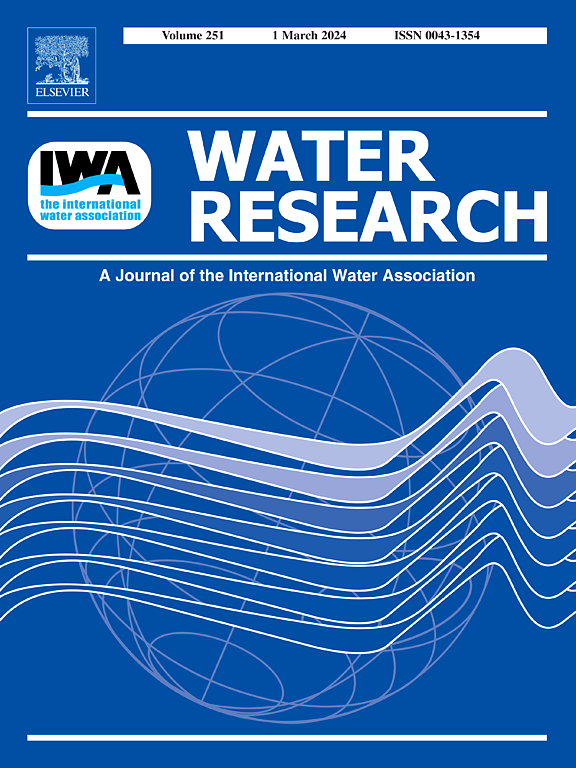Prevalence and functional impact of the interactions between lysogenic phages and hosts in activated sludge systems: insights from large-scale metagenomics and experimental evidence
IF 12.4
1区 环境科学与生态学
Q1 ENGINEERING, ENVIRONMENTAL
引用次数: 0
Abstract
Bacteriophages are the most common biological entities in the activated sludge (AS) of wastewater treatment plants (WWTPs), playing an important role in maintaining or regulating the microbial community. However, the interactions between bacteria and lysogenic phages in AS systems remain poorly understood. In this study, we reconstructed metagenome-assembled genomes (MAGs) from 43 full-scale WWTPs across five countries and found that over 55% of MAGs in AS were lysogenic, highlighting the widespread interactions between lysogenic phages and their hosts. Additionally, diverse novel prophages embedded in the lysogenic MAGs formed complex phage-host interactions, as revealed by the phage-host network, underscoring the intricate relationships between prophages and their microbial hosts. Through in-silico approaches and experimental validation, we confirmed the inducibility and activity of the prophages, showing that prophage induction significantly contributes to the lysis of microorganisms involved in the aerobic oxidation of organic matter, as well as nitrogen and phosphorus removal. This work represents a pioneering large-scale genome-centric metagenomic study, coupled with experimental validation, that uncovers the predominance of lysogenic phage-host interactions in AS systems. It advances our understanding of the pivotal role of prophages in shaping the AS microbiome, particularly in influencing the microbial processes responsible for pollutant degradation and nitrogen and phosphorus removal.

活性污泥系统中溶原噬菌体和宿主之间相互作用的普遍性和功能影响:来自大规模宏基因组学和实验证据的见解
噬菌体是污水处理厂活性污泥中最常见的生物实体,在维持或调节微生物群落中起着重要作用。然而,AS系统中细菌和溶原噬菌体之间的相互作用仍然知之甚少。在这项研究中,我们从5个国家的43个全规模WWTPs中重建了宏基因组组装基因组(MAGs),发现AS中超过55%的MAGs是溶原的,突出了溶原噬菌体与其宿主之间广泛的相互作用。此外,多种新型噬菌体嵌入溶原mag中,形成了复杂的噬菌体-宿主相互作用,正如噬菌体-宿主网络所揭示的那样,强调了噬菌体与其微生物宿主之间的复杂关系。通过计算机方法和实验验证,我们证实了前噬菌体的诱导性和活性,表明前噬菌体的诱导对参与有机物有氧氧化的微生物的裂解以及氮和磷的去除有显著的促进作用。这项工作代表了一项开创性的大规模以基因组为中心的宏基因组研究,结合实验验证,揭示了溶原性噬菌体-宿主相互作用在AS系统中的优势。它促进了我们对前噬菌体在形成AS微生物组中的关键作用的理解,特别是在影响负责污染物降解和氮磷去除的微生物过程中。
本文章由计算机程序翻译,如有差异,请以英文原文为准。
求助全文
约1分钟内获得全文
求助全文
来源期刊

Water Research
环境科学-工程:环境
CiteScore
20.80
自引率
9.40%
发文量
1307
审稿时长
38 days
期刊介绍:
Water Research, along with its open access companion journal Water Research X, serves as a platform for publishing original research papers covering various aspects of the science and technology related to the anthropogenic water cycle, water quality, and its management worldwide. The audience targeted by the journal comprises biologists, chemical engineers, chemists, civil engineers, environmental engineers, limnologists, and microbiologists. The scope of the journal include:
•Treatment processes for water and wastewaters (municipal, agricultural, industrial, and on-site treatment), including resource recovery and residuals management;
•Urban hydrology including sewer systems, stormwater management, and green infrastructure;
•Drinking water treatment and distribution;
•Potable and non-potable water reuse;
•Sanitation, public health, and risk assessment;
•Anaerobic digestion, solid and hazardous waste management, including source characterization and the effects and control of leachates and gaseous emissions;
•Contaminants (chemical, microbial, anthropogenic particles such as nanoparticles or microplastics) and related water quality sensing, monitoring, fate, and assessment;
•Anthropogenic impacts on inland, tidal, coastal and urban waters, focusing on surface and ground waters, and point and non-point sources of pollution;
•Environmental restoration, linked to surface water, groundwater and groundwater remediation;
•Analysis of the interfaces between sediments and water, and between water and atmosphere, focusing specifically on anthropogenic impacts;
•Mathematical modelling, systems analysis, machine learning, and beneficial use of big data related to the anthropogenic water cycle;
•Socio-economic, policy, and regulations studies.
 求助内容:
求助内容: 应助结果提醒方式:
应助结果提醒方式:


